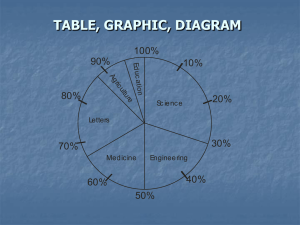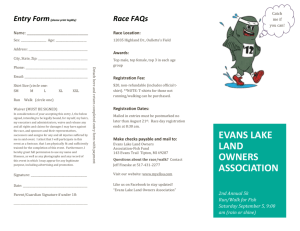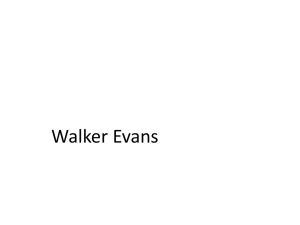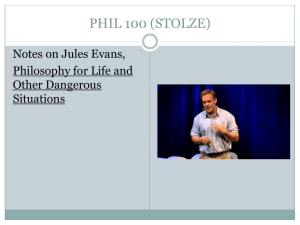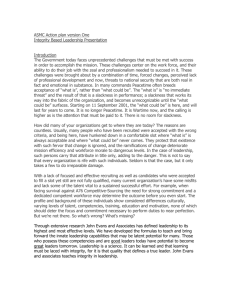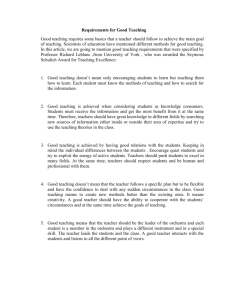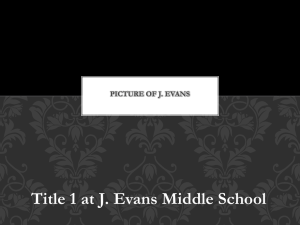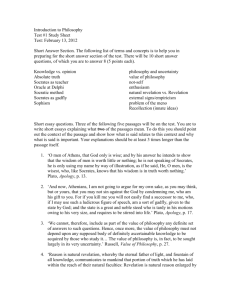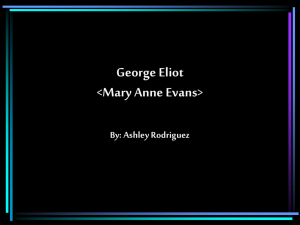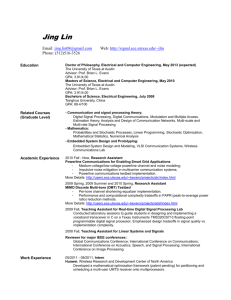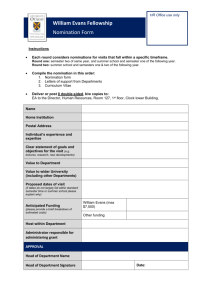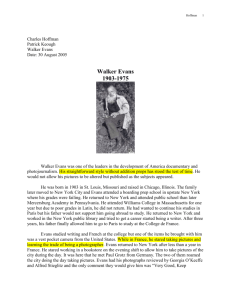2013 William Evans – Philosophy
advertisement
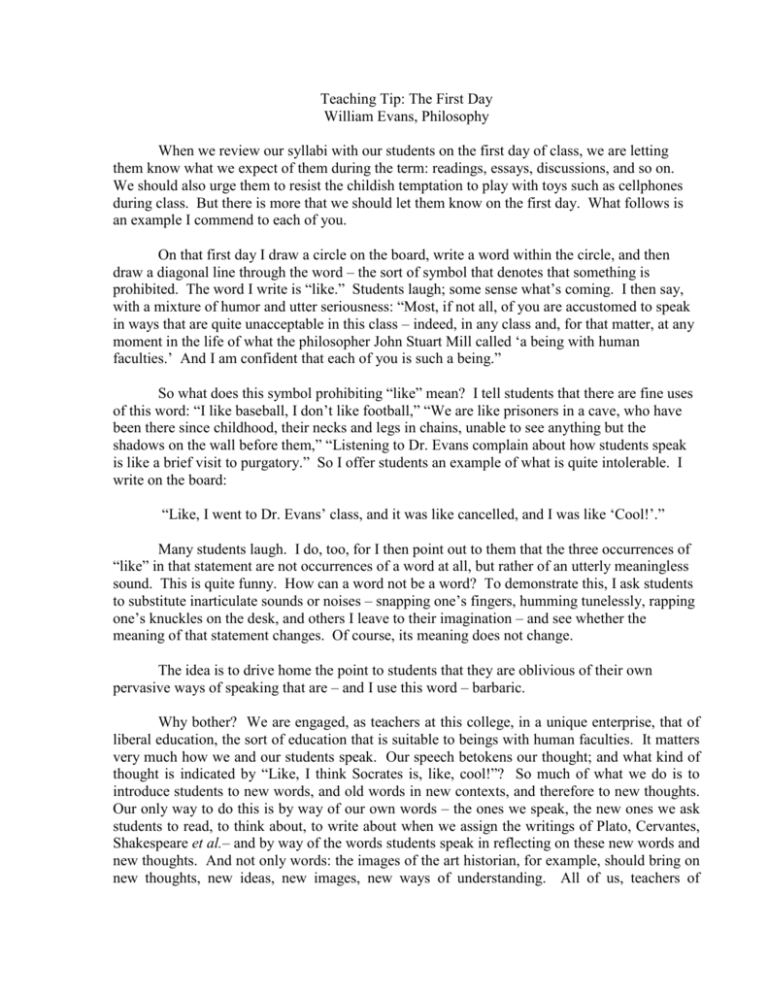
Teaching Tip: The First Day William Evans, Philosophy When we review our syllabi with our students on the first day of class, we are letting them know what we expect of them during the term: readings, essays, discussions, and so on. We should also urge them to resist the childish temptation to play with toys such as cellphones during class. But there is more that we should let them know on the first day. What follows is an example I commend to each of you. On that first day I draw a circle on the board, write a word within the circle, and then draw a diagonal line through the word – the sort of symbol that denotes that something is prohibited. The word I write is “like.” Students laugh; some sense what’s coming. I then say, with a mixture of humor and utter seriousness: “Most, if not all, of you are accustomed to speak in ways that are quite unacceptable in this class – indeed, in any class and, for that matter, at any moment in the life of what the philosopher John Stuart Mill called ‘a being with human faculties.’ And I am confident that each of you is such a being.” So what does this symbol prohibiting “like” mean? I tell students that there are fine uses of this word: “I like baseball, I don’t like football,” “We are like prisoners in a cave, who have been there since childhood, their necks and legs in chains, unable to see anything but the shadows on the wall before them,” “Listening to Dr. Evans complain about how students speak is like a brief visit to purgatory.” So I offer students an example of what is quite intolerable. I write on the board: “Like, I went to Dr. Evans’ class, and it was like cancelled, and I was like ‘Cool!’.” Many students laugh. I do, too, for I then point out to them that the three occurrences of “like” in that statement are not occurrences of a word at all, but rather of an utterly meaningless sound. This is quite funny. How can a word not be a word? To demonstrate this, I ask students to substitute inarticulate sounds or noises – snapping one’s fingers, humming tunelessly, rapping one’s knuckles on the desk, and others I leave to their imagination – and see whether the meaning of that statement changes. Of course, its meaning does not change. The idea is to drive home the point to students that they are oblivious of their own pervasive ways of speaking that are – and I use this word – barbaric. Why bother? We are engaged, as teachers at this college, in a unique enterprise, that of liberal education, the sort of education that is suitable to beings with human faculties. It matters very much how we and our students speak. Our speech betokens our thought; and what kind of thought is indicated by “Like, I think Socrates is, like, cool!”? So much of what we do is to introduce students to new words, and old words in new contexts, and therefore to new thoughts. Our only way to do this is by way of our own words – the ones we speak, the new ones we ask students to read, to think about, to write about when we assign the writings of Plato, Cervantes, Shakespeare et al.– and by way of the words students speak in reflecting on these new words and new thoughts. And not only words: the images of the art historian, for example, should bring on new thoughts, new ideas, new images, new ways of understanding. All of us, teachers of philosophy, theology, history, fine arts, various languages and their literatures, and everything else must aim to stimulate and enlarge the thought, feeling, and imagination of our students in reflecting, ultimately, on the human predicament. To speak thoughtlessly is to think thoughtlessly and thus to block the development of our unique human faculties. To permit barbarisms is to thwart the very purpose of what we do. If we acquiesce upon hearing utterances such as “Like, when I read Socrates’, like, argument, I was like, ‘Awesome!’,” we will make the angels weep. Here is the hard part: during the semester it is essential to enforce, rigorously, this prohibition. Some students have the most awful time breaking this terrible habit; some, when I (or another student) point out to them that they have used the forbidden non-word ‘like,’ deny that they did so. Some don’t even hear what they themselves say. But most students learn to correct themselves, often in mid-sentence. Most see the point. In the process they do learn a little about transforming their thoughts into more worthwhile forms, indeed, to think new thoughts. And we teachers, too, have to live up to this demand to speak in ways that befit us. As Ophelia tells her brother in Hamlet (act 1, scene 3): “Do not, as some ungracious pastors do,/ Show me the steep and thorny way to heaven,/ Whiles, like a puffed and reckless libertine,/ Himself the primrose path of dalliance treads” – and so ignore our own exhortations to do better. William Evans has been a member of the Philosophy Department since 2001. His teaching tip appeared in the September 2013 SPU Scholarly Guide.
